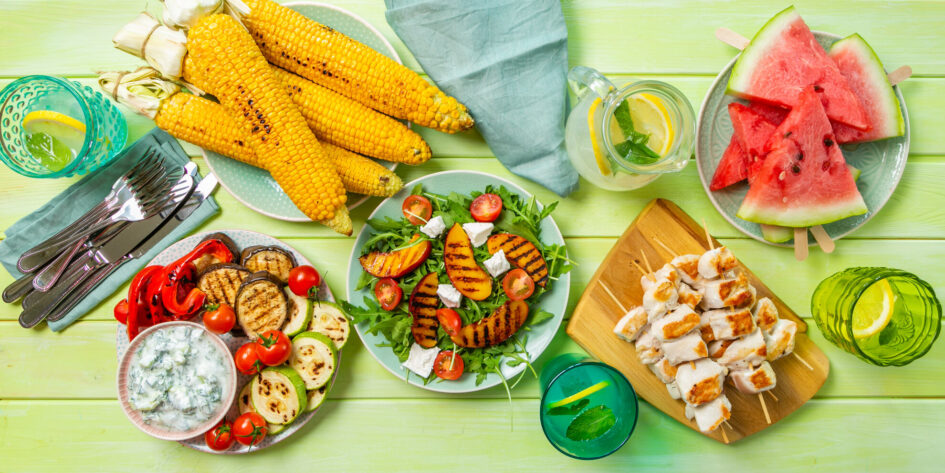Research shows that grilling meat can produce substances that when consumed, may increase risk for certain types of cancers. But nutritionists and cancer-preventers alike say with a few modifications, summertime grilling can certainly be a part of a healthy lifestyle. Here is what healthy grilling out is all about:
Choose a healthy portion of meat and select lean cuts. A healthy portion of any type of meat is roughly 3 ounces, or the size of a deck of cards, and no more than 6 ounces.
Opt for poultry, fish or vegetarian burger patties at times in place of meat.
Trim excess fat from meat and remove all skin. This will help limit flare-ups that can char the meat on the grill.
Keep red meat to a treat and avoid nitrates and nitrites from cured meats (e.g., hotdogs and sausages). When added to cured meats, nitrates and nitrites ensure a longer shelf life but come with a host of health concerns. When cooked over high heat, the nitrites can transform into nitrosamines – a carcinogen.
Make your grates great! Clean your grill grates using a wire brush and wiping them down with a cloth or wad of paper towels to ensure no grill-cleaning bristles get into your food.
Prevent burning and stop smoke. When meat is blackened by charring, carcinogens called heterocyclic amines (HCAs) and polycyclic aromatic hydrocarbons (PAHs) are formed. These compounds can damage our DNA and may increase cancer risk. HCAs are found in charring; PAHs are found in smoke.
Marinate. Marinating prior to grilling is one of the best ways to reduce the formation of HCAs by as much as 96%. Include herbs because their antioxidants help offset the effects of grilling.
Four Elements of a Successful Marinade:
- An acid to tenderize– lemon and lime juice, apple juice, wine, yogurt, buttermilk or vinegars
- Herbs and spices for flavor
- A drop of healthy oil to add moisture (e.g., olive oil)
- Enough time to let the process work (Marinate beef, pork and poultry for at least one to two hours and marinate fish and veggies for at least 30 to 60 minutes.)
Add a dry rub. A dry spice combo made with ingredients like turmeric, garlic and rosemary can cut down the production of HCA by as much as 70%.
Cook low and slow. Cook it for a longer time but at a lower temperature (i.e., under 325 F) by turning the gas down or letting the charcoal burn down to the embers.
Cook meat, poultry and seafood to the right temperatures; use a thermometer.
For Reference:
- Whole chicken or turkey: 165 F
- Chicken or turkey breasts (boneless): 165 F
- Ground chicken or turkey: 165 F
- Hamburgers, ground beef: 160 F
- Beef roasts or steaks: medium-rare – 145 F; medium – 160 F; well-done – 170 F
- Pork: 160 F
- Fish: 145 F
Precook meat first and finish cooking them on the grill. Microwaving meat first (for two minutes) then cooking on the grill can reduce HCAs by 90%. After microwaving, pat meat dry to reduce juice drip and smoke on the grill (FCAs), too.
Flip often – don’t fork. Turn the meat once every minute or so to help prevent HCAs from forming. Flip the meat with a spatula rather than a fork because piercing the meat will release juices that drip and lead to smoke, contributing to FCA production.
Use indirect heat.
- Fire up one side of your grill space but cook on the other.
- Use eco-friendly disposable aluminum pans or invest in a grill plate or grill basket.
- Place aluminum foil under the meat you choose to grill and poke a few holes in it to reduce the amount of juice that drips into the grill and to allow less smoke to reach the meat.
- Raise your grilling surface and move the charcoal briquettes to the sides of the grill.
Before you eat grilled meat, remove any charred portions.
Make healthier homemade side dishes.
Balance meat with veggies and fruit.
- Everyone can benefit from eating more veggies and fruits. But the antioxidants in fruit and vegetables also help protect our body’s cells from carcinogens.
- Veggies and fruits don’t form HCAs. And did you know grilling them intensifies their flavors, too?
- Veggies that are great for the grill when cooked on medium heat include asparagus, onions, mushrooms, zucchini and eggplant.
- Fruits that are great for the grill when cooked on outer edges include apples, mango, melon, pineapple and peaches.
Make homemade, healthier condiments. Or a quick squeeze of lime or lemon just can do the trick of the same squeeze of condiments!
Choose whole-wheat buns.
Sources:
“Five Tips for Healthy Grilling,” Jeanine Detz, consumerreports.org, July 1, 2018.
“Five Tips for Healthy Grilling,” Patrick J. Skerrett, health.harvard.edu, updated May 25, 2016.
“Is Grilling the Healthiest Cooking Method?” Lorna Kring, foodal.com, June 21, 2015.
https://www.consumerreports.org/grilling/tips-for-healthy-grilling/

